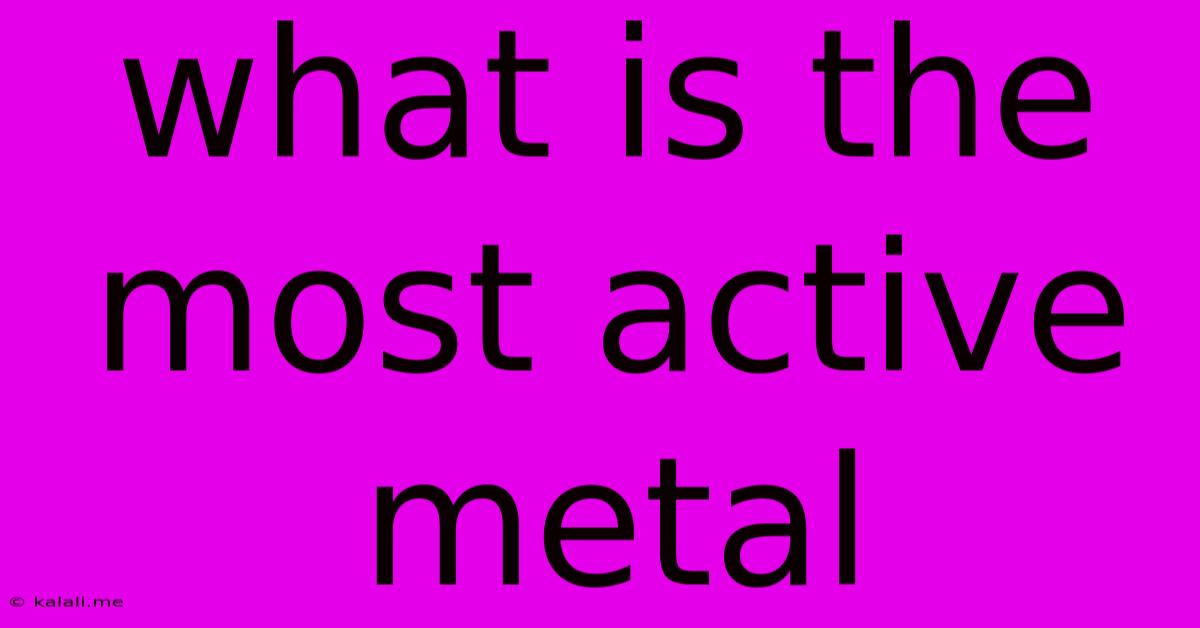What Is The Most Active Metal
Kalali
Jun 12, 2025 · 3 min read

Table of Contents
What is the Most Active Metal? Understanding Reactivity in Metals
The question of which metal is "most active" isn't as straightforward as it seems. It depends on how you define "activity." Generally, we're talking about a metal's reactivity, its tendency to undergo chemical reactions, particularly oxidation – losing electrons to form positive ions. Highly reactive metals readily lose electrons and participate in various chemical processes. This reactivity is directly related to the metal's position in the electrochemical series or activity series of metals.
This article will explore the concept of metal activity, clarifying which metals are considered the most reactive and explaining the underlying chemical principles.
The Electrochemical Series: A Ranking of Reactivity
The electrochemical series is a list of metals arranged in order of their decreasing reactivity. Metals higher on the list are more reactive than those lower down. This reactivity is determined by their ionization energy (the energy required to remove an electron) and electronegativity (the tendency to attract electrons). Metals with low ionization energies and low electronegativities readily lose electrons and are thus highly reactive.
Understanding the trend: Alkaline earth metals (like magnesium and calcium) and alkali metals (like sodium and potassium) are generally found at the top of the series, exhibiting the highest reactivity. These metals readily react with water, oxygen, and acids. Transition metals, on the other hand, tend to be less reactive, while noble metals like gold and platinum are at the bottom and are famously unreactive.
The Contenders for "Most Active Metal": Alkali Metals
While the entire alkali metal group (Group 1) shows high reactivity, cesium (Cs) and francium (Fr) are generally considered the most reactive metals.
-
Cesium: This silvery-gold alkali metal is highly reactive with water, even igniting spontaneously. Its low ionization energy means it loses an electron very easily, leading to vigorous reactions.
-
Francium: As the heaviest alkali metal, francium is even more reactive than cesium due to its larger atomic size and lower ionization energy. However, francium is extremely rare and radioactive, making practical experimentation challenging. Its radioactivity significantly limits its study and practical applications.
Therefore, while francium theoretically holds the title of most reactive metal, cesium is practically the most active metal due to its accessibility and observable reactivity.
Factors Affecting Reactivity
Several factors besides position in the electrochemical series influence a metal's reactivity:
- Surface Area: A larger surface area exposes more atoms to react, increasing the reaction rate. Finely divided metals react much faster than solid chunks.
- Temperature: Higher temperatures generally increase the rate of chemical reactions.
- Concentration: The concentration of reactants also affects the speed of a reaction.
Conclusion: Context Matters
Determining the "most active" metal necessitates clarifying the context. Considering availability and observable reactivity, cesium (Cs) is widely considered the most active metal. Francium is theoretically more reactive but its scarcity and radioactivity make it impractical for most considerations. The reactivity of a metal is a complex interplay of factors, and understanding the electrochemical series provides crucial insight into predicting and understanding chemical behavior.
Latest Posts
Latest Posts
-
The Is The Largest Lymphoid Organ Of The Body
Jun 13, 2025
-
What Is A Websites Unique Address Called
Jun 13, 2025
-
How Many Atoms Are In Oxygen
Jun 13, 2025
-
Which Of The Following Inventions Came First
Jun 13, 2025
-
What Is Visible Mark Of Identification
Jun 13, 2025
Related Post
Thank you for visiting our website which covers about What Is The Most Active Metal . We hope the information provided has been useful to you. Feel free to contact us if you have any questions or need further assistance. See you next time and don't miss to bookmark.